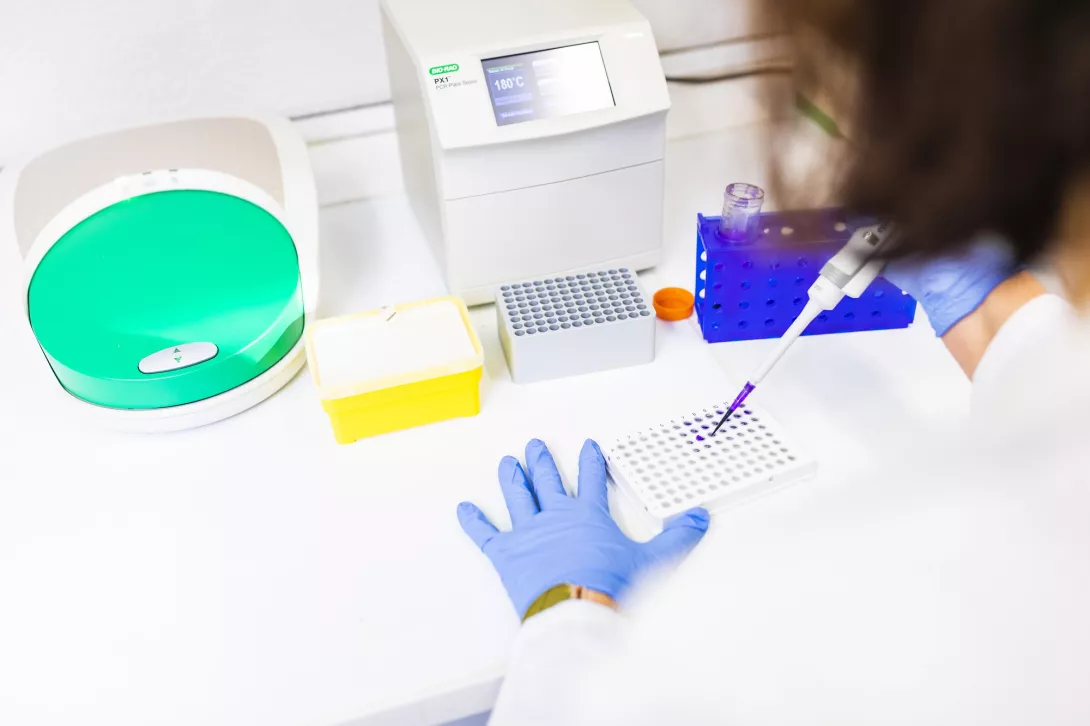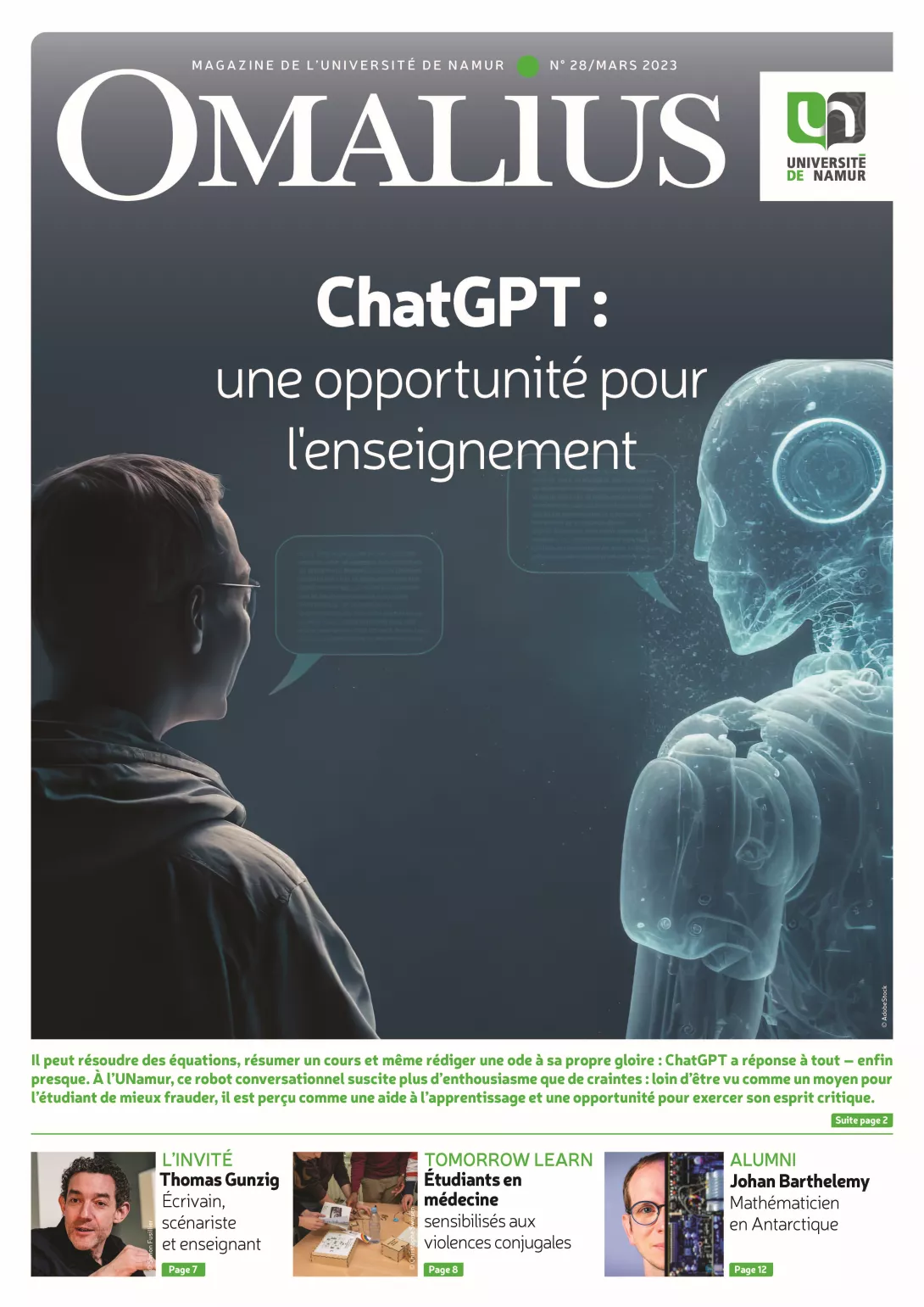
This article was produced for the "The day when" section of Omalius magazine #28 of March 2023.
Biomedical sciences study the normal development and functioning of the human being and the mechanisms underlying the development of pathologies. Complementary to medicine and pharmaceutical sciences, they contribute to improving the understanding, diagnosis and treatment of various human diseases. They also cover many scientific disciplines that study biological structures in an integrated way, from the smallest to the largest: molecules, organelles, cells, tissues, organs, organism. They were first taught at UNamur in 1997 as part of the bachelor's degree. Fifteen years later, a master's programme specialising in the biotechnology and biopharmaceutical industry was set up. This teaching, unique in the Walloon-Brussels Federation and provided entirely in English, integrates fundamental research with preclinical and clinical developments.
More recently, the Department of Biomedical Sciences of UNamur has developed a privileged collaboration with ULiège. Within this framework, several joint degrees have been created, such as the inter-university certificate in regulatory affairs of health products in 2017-2018. Two years later, two specialised masters in biomedical sciences were created: the first in Clinical Research Management (supported by UNamur) and the second in Data Management, a bioinformatics course (supported by ULiège). This led to the opening of a third specialised degree in Preclinical Research. The year 2019 also saw the Department of Biomedical Sciences join the consortium in charge of the European Master in Translational Cosmetic and Dermatological Sciences (EMOTION) as part of the very prestigious Erasmus Mundus programme. The Department teaches clinical development and offers thesis work.
Alumni, professors and professionals gathered to celebrate the 10th anniversary
In the context of this 10th anniversary celebrated on 15 February 2023, a half-day event including several activities gathered more than 180 participants at UNamur. It was an opportunity to discuss the essential role of biomedical sciences in the health sector and to highlight some of the strengths of the Department of Biomedical Sciences at UNamur:
- The organisation of advanced training courses at UNamur with an international dimension, marked in particular by their integration into the Erasmus Mundus programme.
- A collaboration between the ten Departments of Biomedical Sciences of the Belgian universities to submit to the Minister of Social Affairs and Public Health, a request to define a legal statutory framework for the holders of a Master in Biomedical Sciences. The aim is to enable them to pursue a career in the hospital sector.
- A network of alumni with various profiles: researchers, data managers, project managers... to illustrate the diversity of opportunities.
Towards the professional field
The professors come from the academic, industrial, hospital and drug and health product regulatory agency sectors, which makes it possible to offer teaching that is aligned with the realities of the field. "I appreciate the professional approach of the training, which is directly linked to the real world and its problems," explains Sarah, a graduate in biomedical sciences. The study programmes are interconnected with the research carried out within the NARILIS Institute (Namur Research Institute for Life Sciences) and the biopharmaceutical industrial fabric with a research thesis of almost 10 months and a 4-month internship in a professional environment. Graduates of this master’s degree therefore have a set of theoretical and practical skills that offer them numerous professional opportunities. Some continue their master's degree with a doctoral thesis at UNamur, in one of the many research themes developed within the NARILIS Institute or in another Belgian or foreign university. An example? Recently, Leandra Severino, PhD student of the class of 2022, obtained a scholarship at the prestigious Korea Institute of Science and Technology (KIST) in South Korea. Many of the graduates (at master's and doctoral level) are now working in important positions in the academic and industrial worlds.
"Our graduates have access to many professional opportunities in the industrial and academic world. In ten years, the master’s programmes in biomedical sciences have gained recognition from the industrial world and from contract research companies specializing in clinical trial management. "
A few figures
42
nationalities since 2012
40%
international students
20
PhD and post-doc students
50
professors
Why they chose to study biomedical sciences at the UNamur ?
The advantages of the UNamur cursus
- A scientific training coupled with a lot of practical work
- Rapid integration into the working environment
- An excellent command of English in the field;
- Obtaining a certificate of master of experiments and/or biotechnician in laboratory animal sciences.
This article is taken from Omalius magazine #28 (March 2023).

